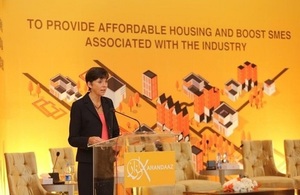New study highlights “massive” economic benefits of low-income housing in Pakistan
The new study called ‘Enhancing Builder Finance in Pakistan’, was launched at an event in Islamabad at the Marriott hotel.

Joanna Reid, the head of the UK’s Department for International Development (DFID) Pakistan speaking at the event.
Investment in low-income housing would bring “massive” economic benefits to Pakistan, according to a new study published by Karandaaz Pakistan and funded by the UK government’s Department for International Development (DFID). The new study, ‘Enhancing Builder Finance in Pakistan’, was launched at an event in Islamabad at the Marriott hotel.
With this study, Karandaaz Pakistan aims to show the wide benefits of building more affordable housing, but also help boost the businesses of Small and Medium Enterprises (SMEs) that work on the building sector.
The study estimates that the construction of 100,000 more houses each year will lead to economic growth as well as increased employment opportunities. According to the study, Pakistan’s economy will benefit massively if affordable housing were to be increased. To achieve this, improvements should be made to the regulatory environment for builders and banks must be given sufficient incentives for mortgage and builder financing. The study can be found on Karandaaz website.
Joanna Reid, the head of UK’s Department for International Development Pakistan, said at the event:
Only the richest of companies can afford to build homes for the richest of people. Pakistan needs financing mechanisms to ensure everyone can have a roof over their head.
Speaking at the occasion, CEO Karandaaz, Mr Ali Sarfraz, said:
We hope that the study Karandaaz has conducted motivates members from the financial sector to take steps in making available financial products better suited to the needs and asset base of SME builders and developers and thereby catalyzing the availability of affordable housing for everyone in Pakistan.
Mr Zaigham Mahmood Rizvi, Chairman Prime Minister’s Task Force on Housing also participated in the event and said:
The stakeholders of housing, namely developer, planners, the Governments, fiscal and regulatory agencies all are needed to be engaged to address affordable housing challenges, both from its supply-side and finance-side parameters. The supply-side players, mainly the developers/builders need to be engaged for meeting this challenge of affordable housing. In turn, this will boost the economy, and create jobs.
Housing and real estate sector is directly linked to about 42 construction materials industries and creates jobs at much higher rate. I reckon that with the government’s focus and assistance from partners such as Karandaaz, the growth of SMEs in building and construction sector will bolster positive impact at the macro level. The state and the private sector should come forward to compliment and support efforts of platforms like Karandaaz.
The event was well-attended by representatives of the banking and building sectors, along with representatives from the government. Following a presentation by the author, Mr Ali Khizar, a discussion on the topic was held with a panel made up of Mr Hassan Bukshi, Chairman Association of Builders and Developers (ABAD); Mr Muhammad Raza Sayeed, Head Housing Finance (Islamic) at HBL; Mr Navid Goraya, CIO Karandaaz Pakistan; Mr Jawed Aslam, CEO and Founder Ansaar Management Company; and Mr Faisal Murad, Group Head from Housing Building Finance Company (HBFC).
The discussion highlighted the need for improvement in current regulatory environment, and factors such as the increases in property prices, rising costs of construction materials, a lack of documentation within the SME builder community and absence of collateral as deterrents to accessing formal financing.
Further information
There are 40 to 50 allied industries associated with the construction and real estate sector, most of which are SMEs. The construction sector contributed 2.7 percent to Pakistan’s GDP in FY17, estimated to be 2.8 percent during FY18. With over 50 industries indirectly associated with the real estate construction sector, the overall economic impact is much higher
Karandaaz promotes access to finance for small businesses through commercially directed investments, and financial inclusion for individuals by employing technology-enabled digital solutions. Karandaaz also develops and disseminates evidence based insights and sector-based studies that can lead to greater financial inclusion, employment generation and SME growth.
Karandaaz Pakistan has financial and institutional support from leading international development finance institutions; the United Kingdom’s Department for International Development and the Bill & Melinda Gates Foundation.
More Information
For updates on the British High Commission and for more information on the Chevening Programme, please follow our social media channels:
- Twitter: @UKinPakistan, @ChevPakistan, @tomdrewUK
Contact
British High Commission
Islamabad
tel. 0092 (0)51 2012000